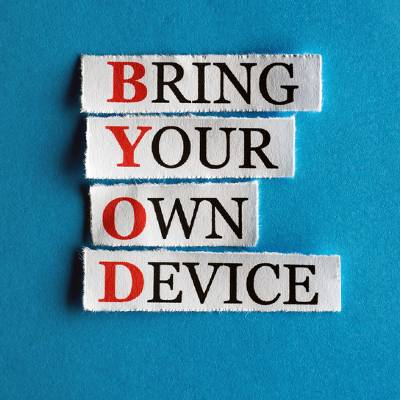SMART Blog
2 of the Biggest Risks Associated with BYOD
 One of the most popular business technology trends that we're seeing is employees bringing their own devices into the workplace (BYOD). This trend is due to the popularity of mobile devices (owned by over half of all U.S. adults). While this trend benefits companies in many ways like enhancing mobility, implementing BYOD for a business is not without risks.
One of the most popular business technology trends that we're seeing is employees bringing their own devices into the workplace (BYOD). This trend is due to the popularity of mobile devices (owned by over half of all U.S. adults). While this trend benefits companies in many ways like enhancing mobility, implementing BYOD for a business is not without risks.
Here are two of the biggest risks that your business needs to be aware of before letting everybody and anybody use their personal devices for work purposes.
Risk of Theft
Having a mobile workforce is a big way to boost your company's productivity, but now you have a lot people running around Detroit with your company's sensitive information stored on a small gadget, and if there's one thing that people are good at it, it's losing small things. With so many U.S. adults owning smartphones, and with people so preoccupied with busy schedules, it shouldn't be a surprise that an estimated 160,000 phones are lost or stolen every day in the United States alone.
When a person loses their personal cell phone, it's annoying because they have to purchase a new one and track down lost phone numbers from all of their contacts. When a person loses a personal phone that's also used for business, the consequences are much worse. This is because the forgetful employee is responsible for putting all of the business contacts stored on the phone at risk of identity theft. Some laws even require that businesses must notify all of the contacts involved if such a breach were to occur, which is an embarrassing letter for any company to send to their customers.
The risk of losing a cell phone shouldn't necessarily deter a business from BYOD. Instead, it should motivate companies to take precautions, like hosting sensitive data over the cloud instead of storing it on the device's memory. There are also security apps available that use GPS to locate a lost device, and biometrics security can be used to lock out thieves. However, none of these solutions will be able to keep out a professional thief that knows how to extract drives and bypass system locks. The best thing you can do is to educate your employees about the seriousness of losing a device with company information on it. This will make them be extra careful when transporting it.
Risk of Stinker Apps
Finding and downloading new and exciting apps is all part of the mobile device ownership experience. You may remember the first week that you owned your device, and how you spent hours exploring Google Play or iTunes searching for new apps. You may also remember downloading some stinker apps that you quickly removed from your device. Employees that use their personal device for work will share this affinity for apps. While many apps are useful and safe, there are a lot of stinker third party apps that can put your company's sensitive information at risk.
These stinker apps often come loaded with malware and spyware, which can extract data from a device and even take control of the device away from the user. Making sure that every BYOD device has a security solution installed on it is a great precaution you can take to help prevent issues like malicious stinker apps, but it's not a guaranteed fix. An employee using a BYOD device may feel entitled to download whatever app they please and bypass the security solution, after all, it is their device. This can make for a messy conversation if you need to get on an employee's case about how their frivolous downloading habits caused a data breach.
Ways You Can Manage These BYOD Risks
For situations like this, the best thing you can do in order to mitigate this BYOD risk is to remove the YO from BYOD. Your company can provide employees with approved devices, loaded with approved apps, and you can implement a policy that says all downloading of third party apps must first be cleared with IT. An employee would still be able to use the company-provided phone for personal tasks, but you will be in a much better position to prevent them from downloading stinker apps on what is technically your device.
These are two of the biggest risks associated with BYOD. There are several other risks involved with BYOD, like legal issues coming from personal and professional lines being crossed, and much more. However, if you really want your business to enjoy the benefits of BYOD, like increased efficiency and improved productivity, then don't let these risks deter you from BYOD. You can still take advantage of BYOD, but we recommend that you're aware of its risks and that you have taken precautions to safeguard your business from them. To learn more about the advantages and the risks of BYOD, and what it takes for your business to implement a mobile strategy that's right for your organization, call SMART Services at 586 258-0650 .




Comments